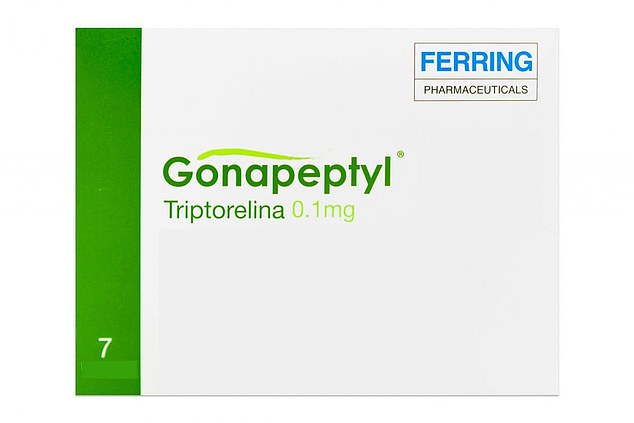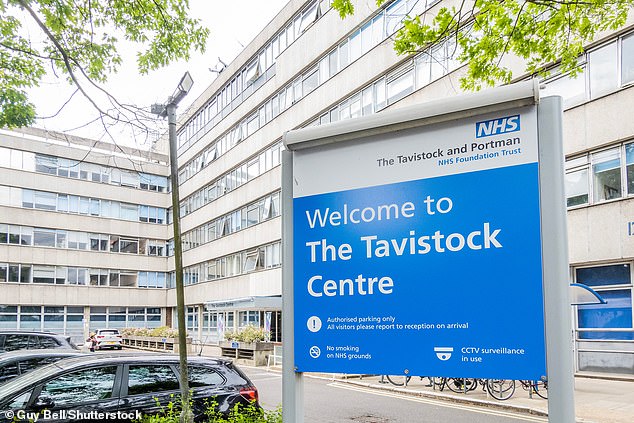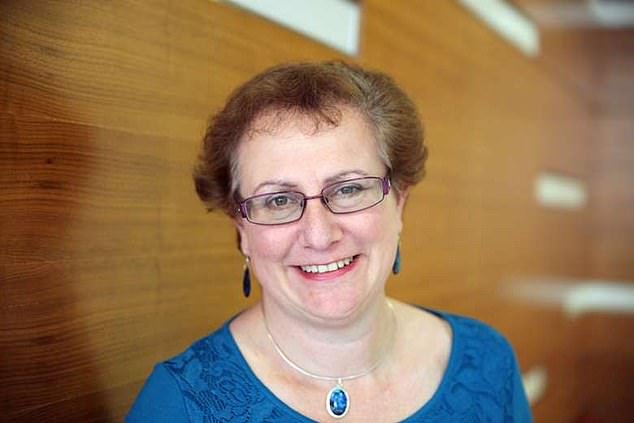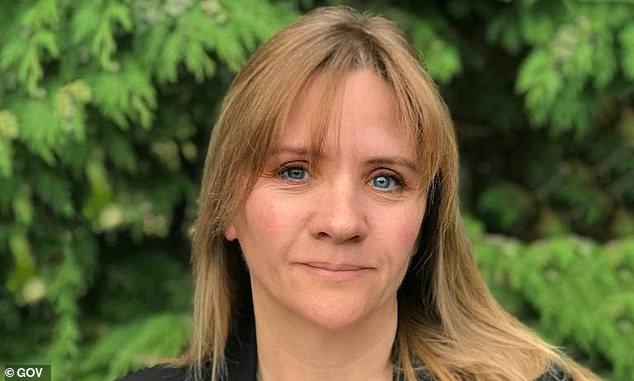
Ministers have been urged to close a ‘loophole’ which allows private clinics to give puberty blockers to youngsters after NHS England halted prescriptions of the drugs for under-16s.
Ministers hailed Tuesday’s landmark ruling, arguing it would help ensure care is based on evidence and is in the ‘best interests of the child’.
The powerful body-altering hormones, which can permanently weaken bones, will now only be available to children as part of clinical research trials.
But campaigners are now warning that the bill must be extended to include private providers amid fears that parents could go to online clinics running a ‘Wild West operation’.
A private members bill introduced by former Prime Minister Liz Truss will be debated on Friday to make it illegal for any healthcare provider to provide puberty blockers or cross-sex hormones to under-16s.
Puberty blockers, known medically as gonadotrophin-releasing hormone analogues, stop the physical changes of puberty in teens questioning their gender. Pictured one example of these drugs, called Triptorelin

Tavistock and Portman NHS Foundation Trust has been accused of rushing children onto puberty blocking drugs by former patients who feel they weren’t challenged enough
Known medically as gonadotrophin-releasing hormone analogues, puberty blockers stop the physical changes of puberty in teens questioning their gender.
For example, they halt the development of breasts in girls and facial hair in boys.
Testosterone helps those born female put on muscle and gives them body hair, while oestrogen promotes the growth of breast tissue in those born male.
‘The NHS has finally recognised that there is no evidence to support puberty blockers,’ Dr Michael Biggs, of anti-gender ideology campaign group Sex Matters, told The Times.
‘As a matter of urgency, private clinics must be stopped from exploiting vulnerable children and adolescents. If this does not happen, those clinics will continue to provide these drugs, which were never licensed to treat gender dysphoria, on demand.’
And co-founder of LGB Alliance Bev Jackson added to the broadsheet that online clinics could ‘make a mockery’ of the NHS ban.
She told the broadsheet: ‘If these drugs cannot be provided on the NHS they should not be obtainable anywhere, particularly not by rogue private clinics operating largely online. We call on the prime minister to support the Health and Equality Acts (Amendment) Bill on Friday that would make these drugs unlawful. Hundreds of vulnerable young people have already been harmed. Rishi Sunak can ensure that no more children join their ranks.
‘We have to close this loophole. If not, then everybody who is convinced they need these drugs will try to get them somewhere else.’

A private members bill introduced by former Prime Minister Liz Truss will be debated on Friday to make it illegal for any healthcare provider to provide puberty blockers or cross-sex hormones to under-16s

NHS England’s ruling comes just months after a public consultation on the issue. It also follows a damning 2020 review of gender identity services for children under 18 by renowned paediatrician Dr Hilary Cass (pictured)
NHS England’s ruling comes just months after a public consultation on the issue.
It also follows a damning 2020 review of gender identity services for children under 18 by renowned paediatrician Dr Hilary Cass.
The report prompted the looming closure of the controversial Gender Identity Development Service (GIDS) at Tavistock and Portman NHS Trust in London.
Former staff said it was fast-tracking vulnerable teenagers into irreversible treatment, inspectors rated it inadequate and the landmark review by Dr Cass warned it was struggling to cope with soaring demand.
Groups such as Mermaids and Gires, which support transgender people and their families, have claimed that delaying a young transgender person’s access to hormone blockers may increase their risk of suicide.
But Dr Cass pointed to a lack of long-term evidence and data collection on what happens to children and young people who are prescribed the medication.
Dr David Bell, a consultant psychiatrist and Tavistock whistleblower, also said the drugs caused ‘considerable damage’.
A rising number of ‘detransitioners’ who regret having the irreversible procedure have also come forwards in recent months and claimed they were not challenged enough as children.
Following the Tavistock’s closure, two new NHS services will now open in early April, situated in London’s Great Ormond Street Hospital and Alder Hey Children’s Hospital in Liverpool.

University College London neuropsychologist Professor Sallie Baxendale published a review of the potential impact of the powerful drugs on teens who take them
The NHS has said children attending these clinics will be supported by clinical experts in neurodiversity, paediatrics and mental health, ‘resulting in a holistic approach to care’.
Following the announcement on the ban on puberty blockers at gender clinics, health minister Maria Caulfield said: ‘We have always been clear that children’s safety and wellbeing is paramount, so we welcome this landmark decision by the NHS.
‘Ending the routine prescription of puberty blockers will help ensure that care is based on evidence, expert clinical opinion and is in the best interests of the child.’
Truss, whose Health and Equality Acts (Amendment) Bill includes a ban on puberty blocker prescriptions to children, both privately and on the NHS, added: ‘I welcome NHS England’s decision to end the routine prescription of puberty blockers to children for gender dysphoria.
‘I urge the Government to back my Bill on Friday which will reinforce this in law and also prevent these drugs being supplied privately.’
The consultation on the future of services received more than 4,000 responses.
John Stewart, national director of specialised commissioning at NHS England, said: ‘Given that the debate is often very polarised, so too were the responses to the consultation.
‘Many people said the policy didn’t go far enough in terms of still allowing potential access (to puberty blockers) through research, and others saying clearly they disagreed fundamentally and that these should be routinely available to everyone who believes they need it.’
Regarding the new clinics, he said: ‘This is just the first step in building a regional model, where our aim is to establish between seven and eight specialist centres including the north and the south hubs over the next year to two years.’
Around 250 patients are expected to be transferred to the new clinics from GIDS when they open.
Some 5,000 more children and young people are currently on the waiting list for referral into the new clinics.
Mr Stewart said: ‘Our two new providers on their own are not going to be able to make a significant dent immediately in that waiting list.
‘But what they are doing is helping us establish a new and fundamentally different service model, in line with advice from the Cass review.’
He said other regional centres could hopefully be commissioned quickly ‘and once we get to that point we should begin to see significant movement in that waiting list and numbers falling.
‘The speed and pace at which the clinics will be able to see new patients off the waiting list is in large part going to be dependent on how successful their ongoing recruitment into the service is, and that is not straightforward.’
New figures show that 83 young people questioning their gender identity began taking puberty blockers in the 12 months to July.
Another 17 began treatment between July and October, according to Freedom of Information responses from Leeds General Infirmary and University College London Hospital which receive referrals from the scandal-hit Gender Identity Development Service (GIDS).
The figures do not include private patients or those treated by a GP so the true figure could be far higher.
All children on the drugs will be able to continue their treatment.
It is understood NHS England hopes to have a study into the use of puberty blockers in place by December 2024, with eligibility criteria yet to be decided.
It comes after a world-renowned expert who found puberty-blockers can harm children’s IQ, last month also revealed academics initially dismissed her research as ‘biased’.
University College London neuropsychologist Professor Sallie Baxendale published a review of the potential impact of the powerful drugs on teens who take them.
Her alarming study highlighted cases where young girls seemingly lost between seven to 15 IQ points while taking the medications, which halt bodily changes in puberty.
But despite the concerning findings, Professor Baxendale initially struggled to find a publisher for her review.
Three separate journals rejected her paper in which she called for ‘urgent’ research into the impact of the drugs on children’s brain functions.
Detailing her experiences on UnHerd, Professor Baxendale revealed that anonymous reviewers cast suspicion on her motives and reasons for exploring the subject in the first place.
But others shockingly accused her of ‘bias’ by questioning if puberty blockers were safe and another said her used of terms like ‘male’ and ‘female’ showed her ‘pre-existing scepticism’ on the subject.

